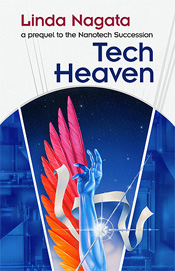Musings on Tech-Heaven
Monday, July 2nd, 2012 Powerful women populate my novel, Tech-Heaven, in a story that explores the impact of cryonics, the slow development of nanotechnology, and political issues surrounding both.
Powerful women populate my novel, Tech-Heaven, in a story that explores the impact of cryonics, the slow development of nanotechnology, and political issues surrounding both.
But is Tech-Heaven a feminist novel? What is a feminist novel anyway?
The protagonist of this story is a woman, Katie Kishida. The two primary antagonists are women as well — Senator Ilene Carson and Roxanne Scott — who are both complex characters in their own right, though they also serve as the face of broad-based social forces.
But here’s the catch: at the center of the conflict between these three women is a man, Tom Kishida. He’s Katie’s husband, Ilene’s brother, and Roxanne’s friend. He’s also the dead man the story revolves around, his body preserved in liquid nitrogen while those who love him wrestle over his fate. Katie wants to rescue Tom, to see him through to a time when advancing technology can repair his body and restore his life. Ilene and Roxanne see things differently.
As several reviewers noted, at its core, Tech-Heaven is a romance, but be warned: it’s a grimly determined one.
What I like most about the character of Katie Kishida is that she’s not remotely a superhero. She’s starts the story as a nearly ordinary wife, mother, and businesswoman, but after her husband’s death her obsessive determination to make cryonics real and workable changes everything: her life, her relationships, and the world around her.
Out of all my novels, I think Tech-Heaven is written closest to a “mainstream†style, with scenes of daily life and reflection included in what becomes from time to time, a bizarre narrative.
The story is a very American one, set primarily in California and reflecting many aspects of American culture.
It’s not directly concerned with the role or status of women, assuming instead that women are capable players — or more accurately, that people in general are as capable as they choose to be. Alliances between characters are not made across gender lines, but are founded on shared beliefs and shared goals.
The story also includes mixed-race marriages while paying hardly any attention to them, because in my experience, when you’re living inside one, that’s how it is. But the story does pay attention to love, family, obligation, ethics, politics, and the determination to see a task through to the end.
Tech-Heaven is not a book aimed particularly at men or women, but at readers interested in exploring different sides of controversial ideas and the fallout of advancing technology.
Is it a feminist novel? If it’s not, then the meaning of “feminism†is uselessly narrow. Is it a humanist novel? I like to think so. From a marketing perspective, I consider it a near-future thriller. We’re already into the early years of that future and it seems to me the story still holds up disturbingly well.
Where to sample/purchase the ebook:
Book View Café (worldwide)
Amazon.com USA
Amazon UK
Barnes & Noble (USA)
Where to order the print version:
Amazon USA
Amazon UK
Booktopia (Australia)
Barnes & Noble (USA)
Powell’s Books (USA)







